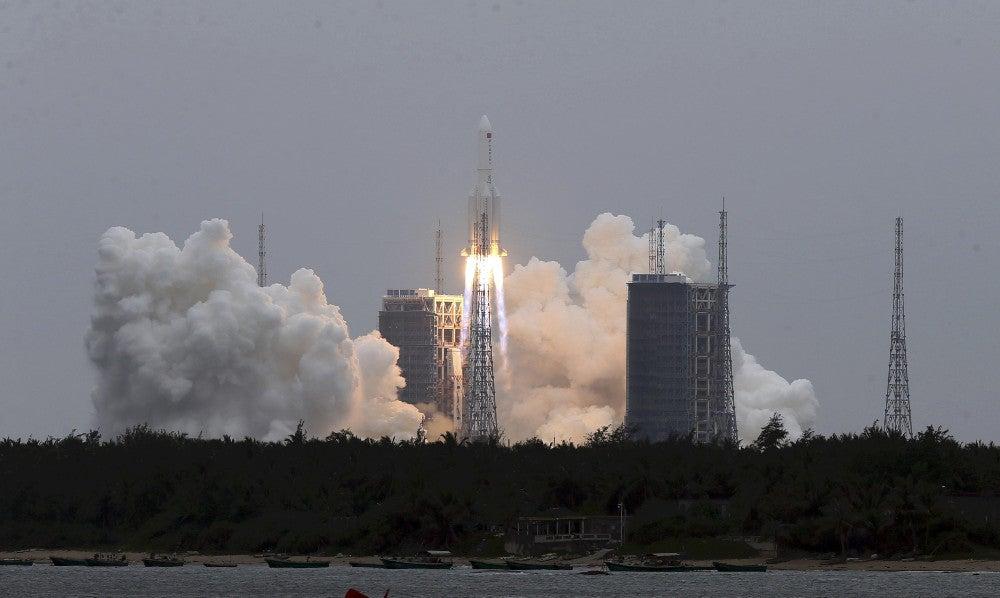WASHINGTON (CNN) A Chinese rocket out of control will re-enter Earth's atmosphere this weekend. While the situation is concerning, it is not unprecedented.
Space junk has fallen on Earth many times in the past, including last year.
Although it is disturbing to hear that such debris falls to Earth, it generally poses little threat to personal safety. "It's not the end of the world," Jonathan McDowell of the Harvard Center for Astrophysics told CNN.
The case, however, raises new questions about space junk and uncontrolled re-entry. Again, questions are being asked about what precautions need to be taken, and whether they need to be taken at all.
Here are some things you need to know.
Most space debris burns up in the Earth's atmosphere before hitting the surface. But large objects, such as rockets, can leave some of them unburned on re-entry and reach inhabited areas.
Last year, the largest piece of out-of-control space junk in history flew over Los Angeles and New York City's Central Park before landing in the Atlantic Ocean.
The space junk, weighing nearly 20 tons, was the empty core stage of a Chinese rocket. It is the largest piece of uncontrolled space debris to fall to Earth since 1991 and the fourth largest in history.
Bigger space junk than this is NASA's space station "Skylab" that fell in 1979, the Skylab rocket stage that fell in 1975, and the former Soviet Union that fell in 1991. Only part of "Salyut 7". The Space Shuttle Columbia could also be added to this list after NASA lost control on its return to Earth in 2003.
That's a huge number.

Over 9,000 tons of space junk floats above us, equivalent to the weight of 720 school buses.
Hundreds of thousands, possibly millions, of objects orbiting uncontrollably. These include used rocket boosters, dead satellites and debris from military anti-satellite missile tests.
When the Outer Space Treaty was signed in 1967, only two governments were in space. The treaty remains the primary international instrument regulating activities in outer space.
Nowadays, as more countries and companies fly into space, regulators face a dilemma. Officials don't want to create lawless zones, but they are reluctant to introduce new rules out of concern that other nations might gain dominance in outer space.
According to Pentagon spokesman Howard, China's large rocket "Long March 5B" is expected to enter the Earth's atmosphere "around May 8," and the U.S. Space Force will de-orbit it. They say they are tracking.
Although the exact location of the rocket's impact cannot be determined until hours in advance, the 18th Space Control Squadron is expected to provide daily information on the rocket's location through its website.
McDowell explains that it's impossible to predict exactly where the debris will go, given the rocket's speed. Even the slightest change in conditions can dramatically change the trajectory of a rocket.
The most plausible prediction is that it will fall into the ocean, but that's simply because the ocean covers most of the Earth's surface.
White House spokeswoman Saki on Wednesday declined to say whether she would seek compensation from China in the event of rocket damage, saying, "At this point, we have no idea. "We're definitely tracking the rocket's location and hopefully we don't have to deal with the consequences of that."
A Pentagon spokesman told CNN that the U.S. military is not considering the option of using kinetic energy to destroy the rockets. The United States has previously demonstrated the ability to shoot down debris as it enters the atmosphere.
Pentagon spokesman Kirby said on Wednesday that the Space Force was tracking the rocket, but said, "Until we have a better idea of where it fell, it's too early to think about what to do about it. ' said.
No need, says McDowell.
"The risk of causing some damage or hitting someone is very small. It's possible, but the chances of hitting you are extremely small. I'm worried that I will be threatened. I won't be able to sleep for less than a second."
"I have more important things to worry about"
